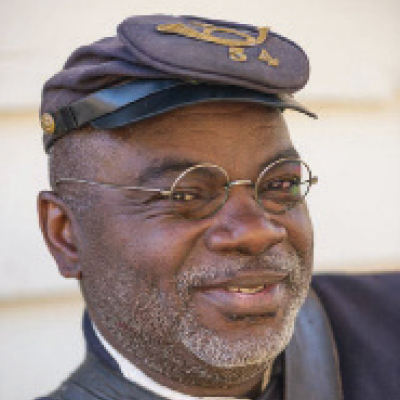Confronting Slavery at Joseph Lloyd Manor
How can Preservation Long Island best engage Joseph Lloyd Manor visitors with Jupiter Hammon’s story, the region’s history of enslavement, and segregation on Long Island today?
At this final roundtable, presented in partnership with the Lloyd Harbor Historical Society, a panel of museum professionals and historic site interpreters explored how historic sites, like Joseph Lloyd Manor, can effectively engage audiences with difficult historical narratives, while encouraging responsible and relevant dialogues about the legacies of enslavement.
Program Moderator
 Cordell Reaves serves as the Historic Preservation and Interpretation Analyst with the NY State Office of Parks, Recreation and Historic Preservation, developing educational programming and events that enable sites to tell complete and inclusive stories. His research interests cover a broad swath of New York State history, including colonial slavery, the Underground Railroad, the anti-slavery movement, and the Great Migration.
Cordell Reaves serves as the Historic Preservation and Interpretation Analyst with the NY State Office of Parks, Recreation and Historic Preservation, developing educational programming and events that enable sites to tell complete and inclusive stories. His research interests cover a broad swath of New York State history, including colonial slavery, the Underground Railroad, the anti-slavery movement, and the Great Migration.
Expert Panelists
 Dina Bailey, CEO, Mountain Top Vision. Dina works with organizations on strategic initiatives in order to strengthen their commitment to being more inclusive as organizations and within their communities. She has also been the Director of Methodology and Practice at the International Coalition of Sites of Conscience, the inaugural Director of Educational Strategies at the National Center for Civil and Human Rights, and the Director of Museum Experiences at the National Underground Railroad Freedom Center.
Dina Bailey, CEO, Mountain Top Vision. Dina works with organizations on strategic initiatives in order to strengthen their commitment to being more inclusive as organizations and within their communities. She has also been the Director of Methodology and Practice at the International Coalition of Sites of Conscience, the inaugural Director of Educational Strategies at the National Center for Civil and Human Rights, and the Director of Museum Experiences at the National Underground Railroad Freedom Center.
 Jessa Krick, Historic Hudson Valley’s Associate Director of Collections, served as a lead researcher for People Not Property: Stories of Slavery in the Northern Colonial North. Ms. Krick brings in-depth knowledge of HHV’s successful efforts to share the stories of Caesar, Abby and other enslaved men, women, and children at Philipsburg Manor and Van Cortlandt Manor.
Jessa Krick, Historic Hudson Valley’s Associate Director of Collections, served as a lead researcher for People Not Property: Stories of Slavery in the Northern Colonial North. Ms. Krick brings in-depth knowledge of HHV’s successful efforts to share the stories of Caesar, Abby and other enslaved men, women, and children at Philipsburg Manor and Van Cortlandt Manor. Joseph McGill, Founder, Slave Dwelling Project. He is a reenactor and descendant of the enslaved who has reached ninety sites, engaging with diverse audiences at historic places through programs, lectures, and spending nights in former slave dwellings.
Joseph McGill, Founder, Slave Dwelling Project. He is a reenactor and descendant of the enslaved who has reached ninety sites, engaging with diverse audiences at historic places through programs, lectures, and spending nights in former slave dwellings.


